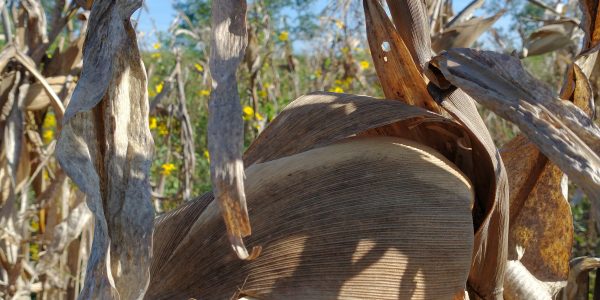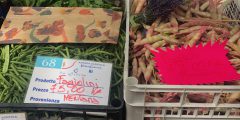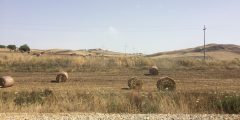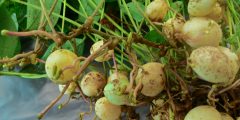Adaptation and resilience in the Yucatan: an ode to farmers – by Karla G. Hernandez-Aguilar
April 23, 2021
Karla G. Hernandez-Aguilar is a PhD student on the Palaeobenchmarking Resilient Agricultural Systems (PalaeoRAS) project I described the challenges of conducting fieldwork in the middle of a pandemic in my blog on 16 April 2021 so now I would like to take this opportunity to reflect upon the qualities of adaptation and resilience that I observed on a daily basis …
Foodprint: how to embed a social enterprise in the community – by Isabel Corlett
September 24, 2020
Foodprint is proud to have set up Nottingham’s first social supermarket, led entirely by University of Nottingham students. Foodprint also serves as a food redistribution network. Foodprint has rightly garnered favourable media coverage for its innovative and impactful work both before and during the Covid 19 crisis of 2020. However, it would not have been able to carry out this work if it had not already succeeded …
Changing commensality during the crisis: the Nottingham Social Eating Network and Covid-19
June 10, 2020
This post is written by Marsha Smith. The Nottingham Social Eating Network and its community food partners in the city mobilised to meet the rising demand for food aid support during the early stages of lockdown. In this post, I reflect on how the values of ‘social eating’ initiatives are being translated into emergent, localised …
The Perfect Storm: Environmentally and Socially Unsustainable Seafood Supply Chains
May 19, 2020
This post is written by Lee Matthews, Lucy McCarthy and Anne Touboulic. Seafood supply chains sustain three billion people nutritionally and also provide 10% of the world’s population with employment, the vast majority of whom are small-scale fisher-people. Seafood provides access to safe protein for many of the world’s most economically marginalised people but these …
Elizabeth David on food and belonging: Keeping house during a lockdown
May 5, 2020
This post is written by Dr Richard Vytniorgu, Impact Research Fellow in the School of Cultures, Languages, and Area Studies. The Challenge of Covid-19 For those of us who can, working from home has become the new normal, squeezing our entire lives into the four walls we call home. Inviting friends and family over for socialising …
Global trading: the good, the bad and the essential
April 27, 2020
This post is written by Lucy McCarthy (QUB), Anne Touboulic (University of Nottingham), and Lee Matthews (University of Nottingham). In our last post, we began our journey considering food supply chains in times of pandemic and we touched upon their history. Here, we further consider some of the flaws in our globalised food systems and …
UK Plant Health Week: A conversation with a plant pathologist
April 21, 2020
2020 is the International Year of Plant Health and April 20-27 is UK Plant Health Week. We spoke to Dr Rumiana Ray, a Crop Pathologist, about the importance of plant health, and what you can do to support keeping plants healthy. You are a specialist in crop pathology, what does that mean? Plant pathologists …
Global food supply chains in times of pandemic
April 7, 2020
This post is written by Anne Touboulic, Lee Matthews, and Lucy McCarthy The public health crisis unfolding before us is unprecedented, unimaginable and catastrophic. It will profoundly impact our values and lifestyles as it exposes the implications of national austerity measures on public services and the precariousness of our globalised production and consumption systems. Food supply chains …
Coronavirus and the food system: a reading list
March 26, 2020
Gardening and growing Growing and gardening while in isolation, by Mark Diacono (Facebook/Telegraph) Land available for allotment use has declined 65% since the 1960s (Institute for Sustainable Food, Sheffield) Food supply chains The UK’s food supply and a call for rational rationing, by Prof Tim Lang (The Conversation) Interview with Tim Lang, by Jay …
Plants for future food security: the case of Bambara groundnut
March 23, 2020
Future Food Beacon researchers in Malaysia and UK are working with partners in Africa and Asia to help secure the future of our food supply. They are doing this by exploring the wider use of crop diversity to fill food production and nutrient gaps, making a diverse range of food crops available and accessible to …
Subscribe by email
About this blog
Future Food addresses challenges of feeding a growing population in an ever-changing world. Our multi-disciplinary researchers are delivering new techniques to solve food issues from soil to molecule to meal.
Useful links
Categories
Recent Posts
- Eating Your Way to a Greener Future
- Can Agriculture Save the Planet? Insights from COP28 and Beyond
- Time to diversify rather than demonize our dietary protein sources
- “I guess it’s quite trendy”: New research explores young meat-eaters’ sustainable food consumption habits.
- Fungi alternatives could diversify sustainable sources of protein to feed the world
Tags
Recent Posts
- Eating Your Way to a Greener Future
- Can Agriculture Save the Planet? Insights from COP28 and Beyond
- Time to diversify rather than demonize our dietary protein sources
- “I guess it’s quite trendy”: New research explores young meat-eaters’ sustainable food consumption habits.
- Fungi alternatives could diversify sustainable sources of protein to feed the world
Archives
- February 2024
- December 2023
- October 2023
- July 2023
- June 2023
- May 2023
- April 2023
- March 2023
- January 2023
- December 2022
- November 2022
- October 2022
- September 2022
- August 2022
- June 2022
- May 2022
- April 2022
- March 2022
- December 2021
- November 2021
- October 2021
- September 2021
- August 2021
- July 2021
- June 2021
- May 2021
- April 2021
- March 2021
- February 2021
- January 2021
- December 2020
- November 2020
- October 2020
- September 2020
- August 2020
- July 2020
- June 2020
- May 2020
- April 2020
- March 2020
- February 2020
- January 2020
- December 2019
- November 2019
- October 2019
- September 2019
- August 2019
- July 2019
- June 2019
- May 2019
- April 2019
- March 2019
- February 2019
- January 2019
- December 2018
- November 2018
- October 2018
- August 2018










Recent Comments